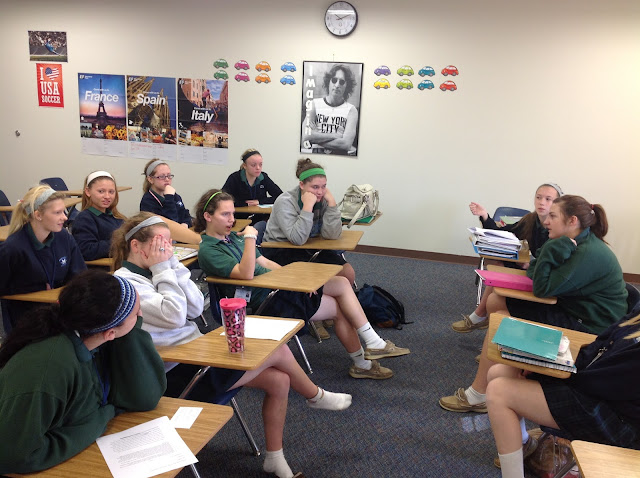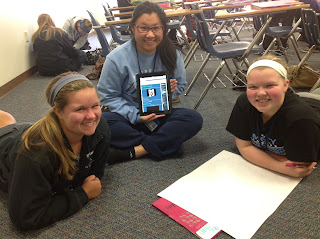Introducción
Eva Duarte de Perón is arguably one of the most influential & notable women of modern Latin America. She was a woman of many distinctions - some were illustrious and others were demeaning. Eva, the illegitimate child of a prominent politician, grew up in a poor family in the suburbs of Buenos Aires, Argentina. She had always dreamed of becoming an actress and did anything in order to meet and befriend influential people that could help her climb to the top. She eventually found herself as the nation's First Lady, living in style in the Casa Rosada. During her time as First Lady, she created, among other things, the Fundación Eva Perón [see notes 11/5 & 11/6]. Eva's death on July 26, 1952, brought the nation to its knees and forced the country to analyze both Evita's contributions and detriments to Argentine society.
Las Preguntas Esenciales
How was Evita different than most women of her time period & of her culture?
If Evita Peron was a man, would she have been subjected to the negative terms applied to her?
Evita Perón has been viewed as both a sinner and a saint. Which is she?
How did Evita’s early death contribute to her popularity?
If Evita Peron had lived, would her popularity have died?
What did Evita Perón contribute to the women of Argentina, and to women across the globe?
Can Evita Perón be seen as a role model for young women today?
La Tarea
You have been separated into groups, each of you with a well-defined role within the group [see roles below]. Each person must research her role and formulate an opinion on the essential question: Was Evita Perón a sinner or a saint? Then, as a group, you must come to a consensus to convince the Argentine government [that would be me, your teacher! I'm pretty powerful, huh?] that Eva Perón is worthy of sainthood or should be remembered as a sinner who tarnished our great nation. Remember that it is your job as an individual to advocate for your opinion to become the opinion of the group as a whole. You will present your proposal to the class [in English].
Proceso y Recursos
Paso 1: As a group, you should read through the following links so that you all have the same general knowledge base from which to draw. You should also look through the books that I have placed on reserve for you in the library or see Ms. Hortert for resources. You can also check out the Mercy Academy Library blog in order to access her online links & literary toolkit! I've included a few links & book titles [not available in our library] below. Take notes!!
Evita, First Lady: A Biography of Eva Perón by John Barnes
Evita by Fraser & Navarro
In My Own Words by Eva Perón
Eva Perón: The Myths of a Woman by Julie Taylor
Paso 2: As a group, you must decide which of you will fulfill each of the following roles. Read the descriptions before you choose your role: bourgeoisie, military, descamisado, or woman. Each role must have at least 1 person in it; in groups of 5, there will be 2 people assuming the same role.
Bourgeoisie (upper class): During the time that Perón ruled in Argentina, the upper class consisted mainly of European immigrants who were not amused by a poor woman from the lower class rising to the seat of First Lady. Many of the members of this class argued that Eva's politics favored the lower class. Focus on the negative social aspects of Eva's policies towards the upper class. Use the following links, Evita's biography & class notes, but do not limit yourself to these sources. I expect you to find your own [quality] references.
**start at the 7th paragraph under the second picture(click on Fundación Eva Perón)scroll down to "During Peron's Leadership..."
Military: While it was not uncommon for military leaders such as Juan Perón to have a woman at their side, it was not commonplace for the men to allow the woman to influence him to the degree and scope that Eva did. Eva made many changes to government policy that affected the military. You should focus on the way the military felt towards Eva's influence, how her policy affected them, and what she did that led them to react to her death by taking over the government in 1955. Use the following links, Evita's biography & class notes, but do not limit yourself to these sources. I expect you to find your own [quality] references.
Descamisado: Descamisado was the affectionate nickname that Eva gave to the lower class of Argentine workers. Eva gave them hope for the future because she had once been were they were. They looked to her for help to reconcile their economic conditions. As a lower class worker, you should focus on the positive social and economic effects for the working class. Use the following links, Evita's biography & class notes, but do not limit yourself to these sources. I expect you to find your own [quality] references.
Woman: Before Eva, women in Argentina had little to no say in politics or anything else. The emergence of Eva as a strong, influential female leader gave Argentine women hope and confidence. Analyze how Eva's policies and politics positively affected women in Argentina in the 1950s. Use the following links, Evita's biography & class notes, but do not limit yourself to these sources. I expect you to find your own [quality] references. You may also want to read through some of the links for the descamisado, as some pertinent information on women can be found there as well.
Calificación [45 pts.]
Individual [10 pts.]: You will be graded individually on the information you find according to your role in the group [bourgeoisie, military, descamisado, or woman]. You should submit a typed page with at least 5 major points [in bulleted or list form] that support the focus of your persona. For example, the woman should tell me 5 major effects of Evita's policies and politics on women in Argentina. You should also write a concluding statement telling me whether you think Eva was a sinner or a saint & why
[not to exceed 1 typed page]. This page should be included in your group packet [see below] & is due on 11/13 & 11/14.
Group [20 pts.]: As a group, you must submit 1 stapled set of papers that includes each individual's opinion. The top sheet of this packet of information should be your group's consensus as to whether Eva was a sinner or a saint. You should have your top 5 reasons for your decision in bulleted form followed by 2 explanatory paragraphs [in English] that describe why you are taking this position. The top sheet should not exceed 1 typed page. This will serve as the basis for your presentation and debate in class on 11/13 & 11/14.
In-Class Discussion & Debate [15 pts.]: On 11/13 & 11/14, in class, we will have a discussion/debate to decide Eva's fate. If everyone comes to the same conclusion [which I hope you will not], we will have a discussion of your findings. If we have close to equal representation of both opinions, we will have a debate or mock trial.
Your grade for this portion of the project will be based on participation by your group. Each group will choose a spokesperson who will present an "opening statement" that voices the opinion of your group, backed by your research. I do not want to hear, "We think she's a saint because she helped poor people" or "We think she is a sinner because she ran away with a tango singer". You must have some solid facts to back up your opinion - this is where your research will be vital!
Once all groups have presented their opening statements, I will moderate a discussion/debate among the groups in order to come to a final, general consensus. If your group participates satisfactorily (serious, factual presentation), you will receive all 15 participation points. If your group does not present and/or participate, you will get 0 points. If the group does not remain serious or does not back up its argument with facts, you will receive 5-10 points.
Sinner or Saint? The choice is yours to make. However, there is no disputing the fact that Evita Perón made some outstanding and outlandish contributions to Argentina during her short lifetime. From the dirt roads of Los Toldos to the balcony of the Casa Rosada, Eva left her unmistakable mark on Argentine society as well as the rest of Latin America and the world.












.JPG)

.JPG)

.JPG)

